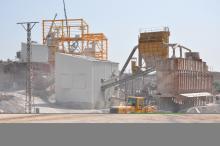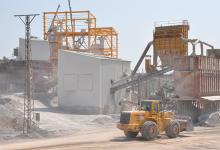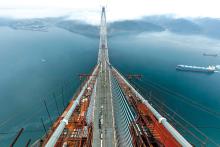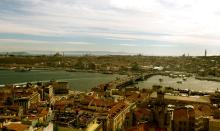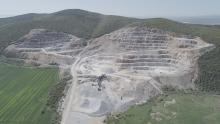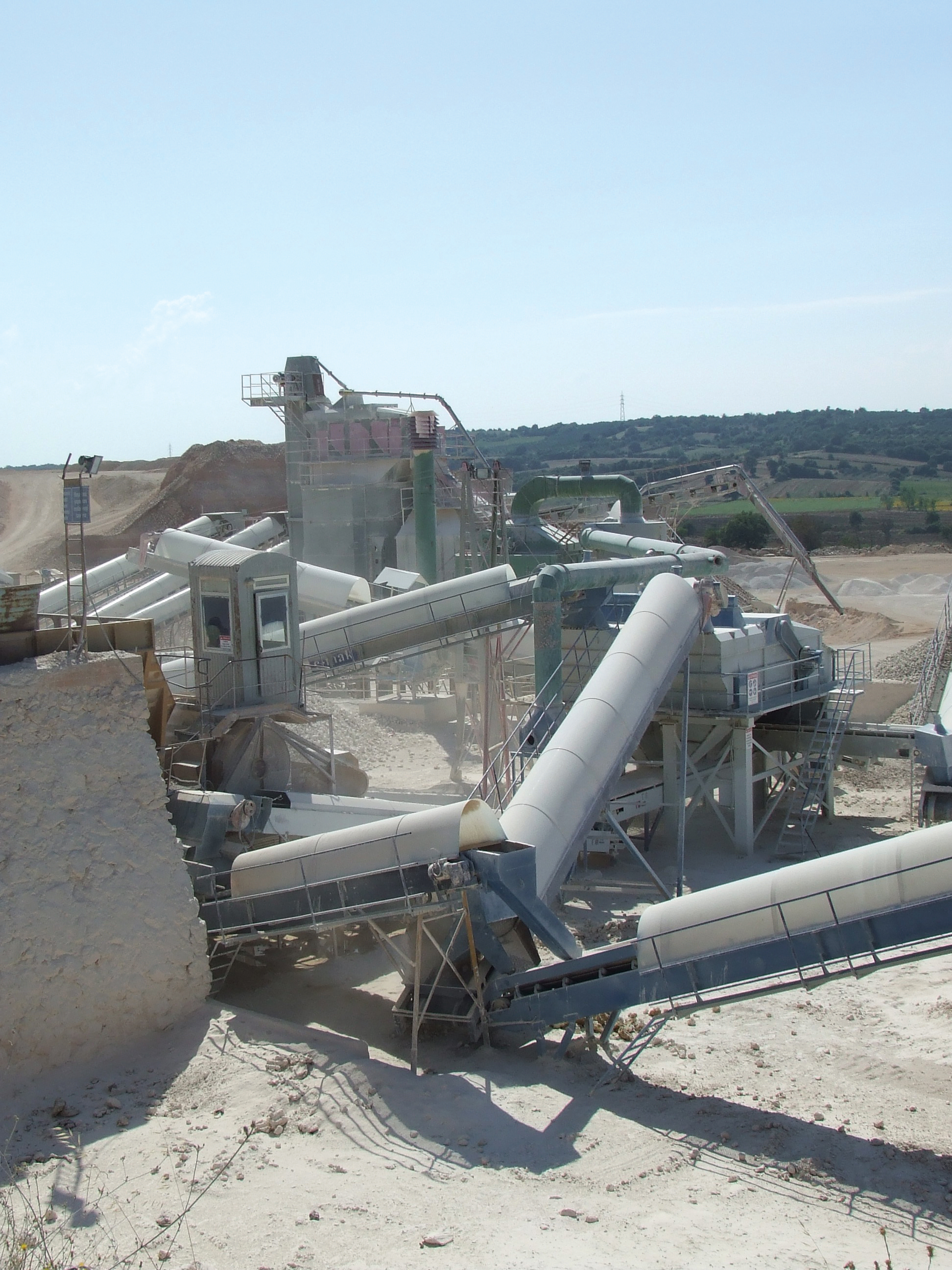
Turkey’s bid to join the EU has seen a big investment in infrastructure and is a boost to its aggregates industry. A geologically diverse country, Turkey boasts most kinds of rock among its outcrops and formations. Along with huge quantities of hard rock there are also useful sources of sedimentary and magmatic rock. Julie-Anne Ryan reports
Most of Turkey’s aggregates market involves the processing of limestone material, though the relatively small quantity of basalt formations are also used for the region’s aggregates, especially for those projects that need high quality concrete or, increasingly, top surface for asphalt roads.
Turkey is the fourth largest aggregates producer in total volume with 315 million tonnes, according to 2010 UEPG (
The country’s limestone sector produces about 43% of the world’s limestone reserves, and is known for major quarrying as well as asphalt and cement production industries.
Over the years, indigenous manufacturers have developed to serve these sectors.
With one of the most competitive and dynamic construction industries in the world, Turkey has strong links to other regions where construction activity is also strong such as North Africa, the Middle East, Asia and Russia.
Turkey’s manufacturers are performing well at home and in its export markets. According to the Turkish Statistical Institute’s Quarterly Turnover Index, construction increased by 11.5% in the fourth quarter of 2012 compared with the same quarter of the previous year.
The north-west of the country, particularly in and around the largest city, Istanbul, sees the greatest concentration of production and consumption, up to about 100 million tonnes/year. The 315 million tonnes national total includes natural sand and gravel production, though the quantities of these are relatively small because current legislation places restrictions on river-bed extraction.
Regulations in production are closely watched across the industry, in fact, and in April this year the Ministry of Environment and Urbanisation fined 53 Istanbul-based quarries for failing to comply with environmental laws. Companies, mainly located in Cebeci, Sultangazi, were fined a total of €424,143.39. A number of companies’ operations were also halted temporarily, and the Ministry will continue with inspections in the Tuzla area.
As a result, most sand has to be produced by crushing and so crushed aggregates account for about 90% of the total production.
Government and local communities alike take a great interest in quarries thanks to issues such as dust emissions. Aggregates producers find opposition to investment in expanding operations, and find themselves under pressure to exhibit action in the recycling of construction and demolition waste. Biodiversity and quarry rehabilitation schemes have been watchwords in recent times.
The shape and scope of Turkey means that there are big differences in the business even within the country. Prices on the European side are higher than on the Asian side and there are more quarries on the European side and demand for aggregates and the total production is greater than on the Asian side.
The plants and quarries on the Asian side are more modern and have a higher capacity, but demand for aggregates there is lower and competition drives the costs down.
Into the future, there are several drivers to continued growth and investment. A key reason for much of the sector’s activity is the target for Turkey to join the European Union in 2015, which obviously demands the development of an improved infrastructure. Added to that is the aim of the Turkish General Directorate of Motorways (KGM) to build more than 2,000km of roads in 2013. This total comprises 998km single-platform roads and 1,070.5km of dual carriageway: of the dual carriageway 20.5km will be added to motorways and 1,050km to state roads. Almost 20,000km roads will be asphalt covered or repaired.
KGM currently manages 63,250km of state roads and 2,250km of motorways in Turkey.
Looking even further to the future, the plan is to build a total of 9,700km dual carriageway and 5,550km of motorways by 2023. The total investment is said to be up to €20 billion and will include the Bosphorus crossing project in Istanbul, a new tunnel that will connect the European and Asian sides of the city.
This highlighting of road development as a key economic priority has led to plans for a new asphalt road construction exhibition, Asphaltist, in Turkey during 2014. The event will be held at Istanbul’s Expo Centre from 6-8 February 2014, and aims to attract key manufacturers and industry players to the event.
Major players throughout the sector are attaining and keeping a high profile.
Most of Turkey’s cement producers have their own aggregate production and ready-mixed concrete plants, while international names in Turkey include
The decision to join forces meant that the consolidated companies were no longer in competition and that fewer people and less construction machinery and other equipment were required.
Chairman of the Turkish Cement Manufacturers Association (TCMB) Mustafa Guclu believes that Turkey’s cement consumption will come out at around 58.5 million tonnes for 2012. He expects sales of the sector to increase by between 4-5%.
Cimentas and Cimbeton, acquired in 2001, are Cementir Holding Turkish subsidiaries. They operate four cement plants and 15 ready-mixed concrete plants.
Cimentas is the first foreign-owned Turkish player with annual production capacity of 5.4 million tonnes of cement. Since 2001 Cementir has invested more than US$530 million (€403.6 million) to expand capacity and to increase efficiency in order to consolidate and enhance its presence in Turkey.
The group’s cement production facilities provide a broad exposure to the domestic market as well as export capacity.
Akçansa, currently a
Operating in the Marmara, Aegean and Black Sea regions of Turkey, Akçansa produces cement at its Istanbul, Çanakkale and Ladik plants, and ready mixed concrete at nearly 40 RMC plants under the Betonsa brand. Operating out of the Ayazaga, Bursa and Saray aggregate quarries as Agregasa, Akçansa operates five cement terminals in Ambarli, Aliaga, Yarimca, Yalova and Hopa.
The company’s total production in 2012 met 12.5% of Turkey’s total cement consumption, and its domestic cement and clinker sales topped five million tonnes in 2012. By adding clinker and cement exports of 2.4 millon tonnes, Akçansa’s total cement and clinker sales totalled 7.4 millon tonnes while total revenue was €450 million (TL 1,056 million) in 2012.
The Vicat Group operates four aggregate quarries near Ankara and one near Konya, all of which supply massive rock aggregates, and one alluvial rock quarry near the Mediterranean coast.
The group has operated at two sites in Turkey for more than 15 years.
Other quarrying areas of production are looking optimistic, too. Natural stone manufacturer Dunya Tas grew by 67% in 2012 to generate a €19.47 million turnover.
The company currently exports 100% of its production to China but plans to enter different markets soon.
And Turkish marble producer
Active in the marble quarrying sector since 1987, Az-Tas Mermer aims to employ between 30 and 40 new workers as part of the new factory project.
And several EH4000AC-3 rigid dump trucks and an EX5600-6 ultra-large excavator are being supplied to the largest Turkish gold mine following an order by Tƒprag Metal Madencilik Sanayi ve Ticaret.
The company is a subsidiary of the Eldorado Gold Corporation, a Canadian mining company, which has developed the Kisladag Gold Mine, located in west-central Turkey between Izmir and Ankara.
Kisladag mine began production in 2006 and is currently operating as an open pit, heap leach mine with a throughput of 12.5 million tonnes a year of ore processed.
Plans are underway to increase the mine’s production to approximately 33 million tonnes per year, which will include a larger mining fleet using bigger loading and hauling equipment.
The EH4000AC-3 rigid dump trucks will be run on a trolley assist system and the EX5600-6 is an electric driven model. All the machines will be powered by an electric power line on-site, reducing fuel costs considerably. Although this kind of technology has already been adopted by
The open-pit mine already has two EX3600-6 ultra-large excavators, which were delivered in 2006.

